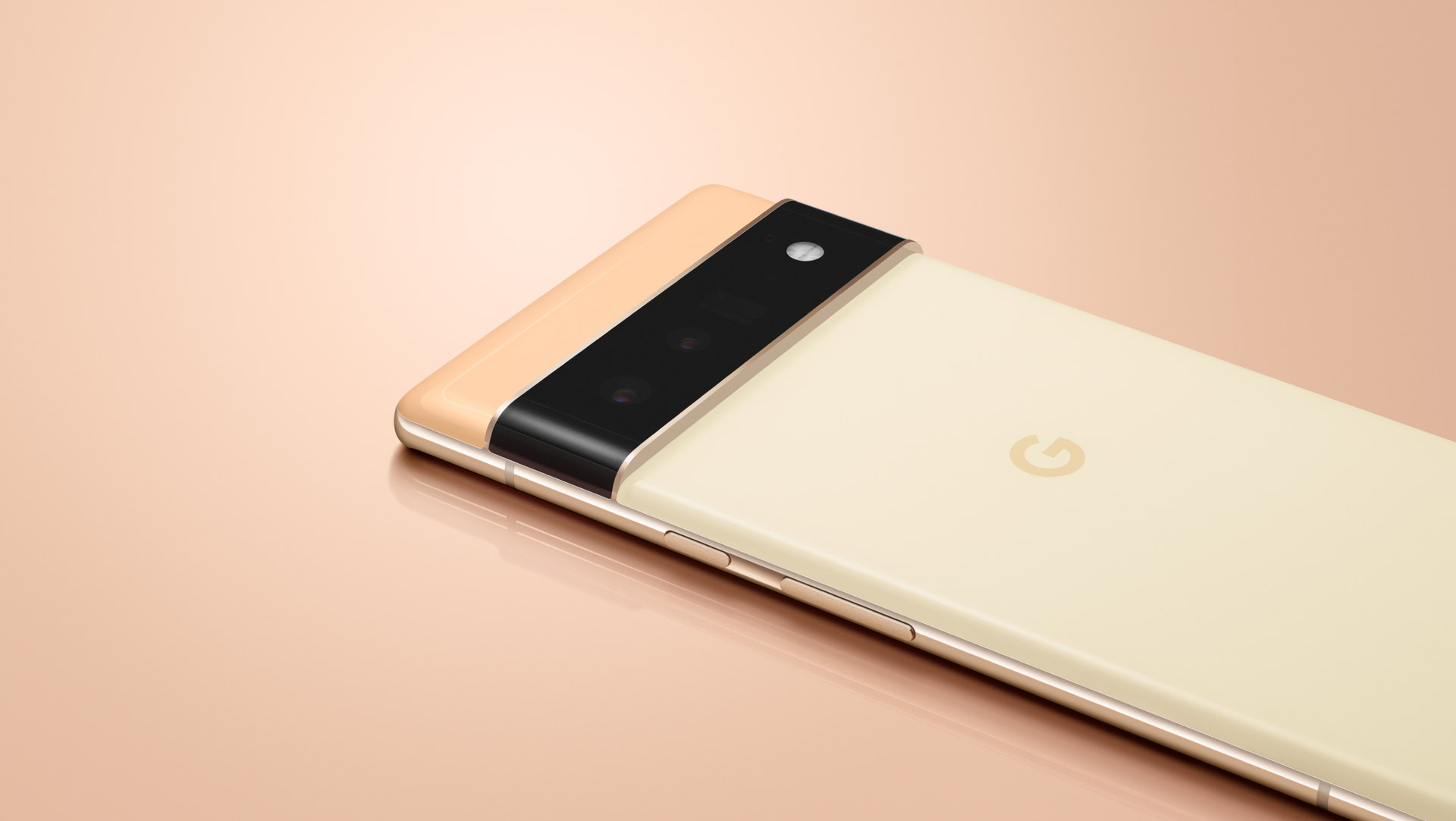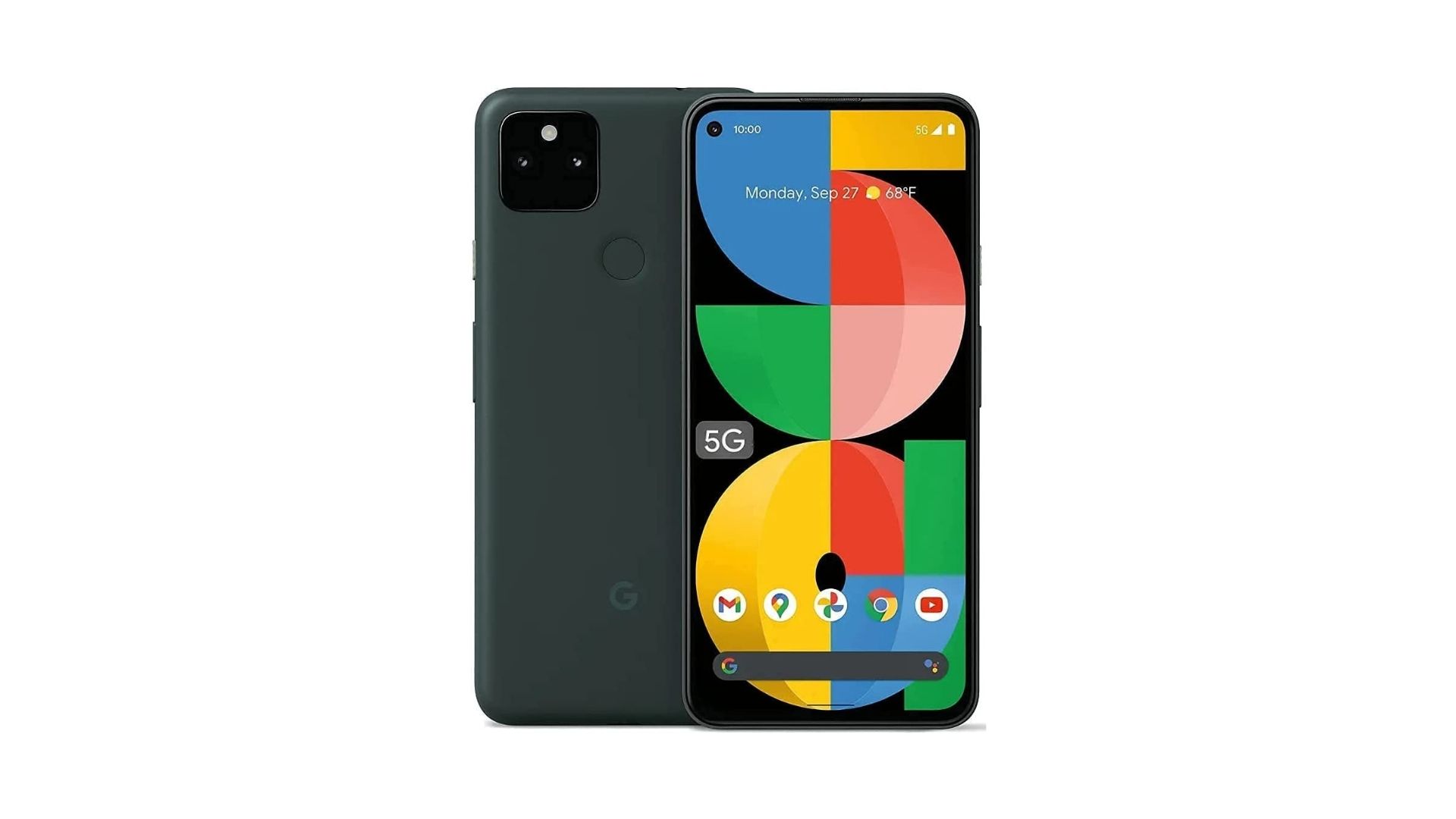Affiliate links on Android Authority may earn us a commission. Learn more.
Google Pixel 6 vs Pixel 5a: What's the difference and which should you buy?
Published onMay 20, 2022
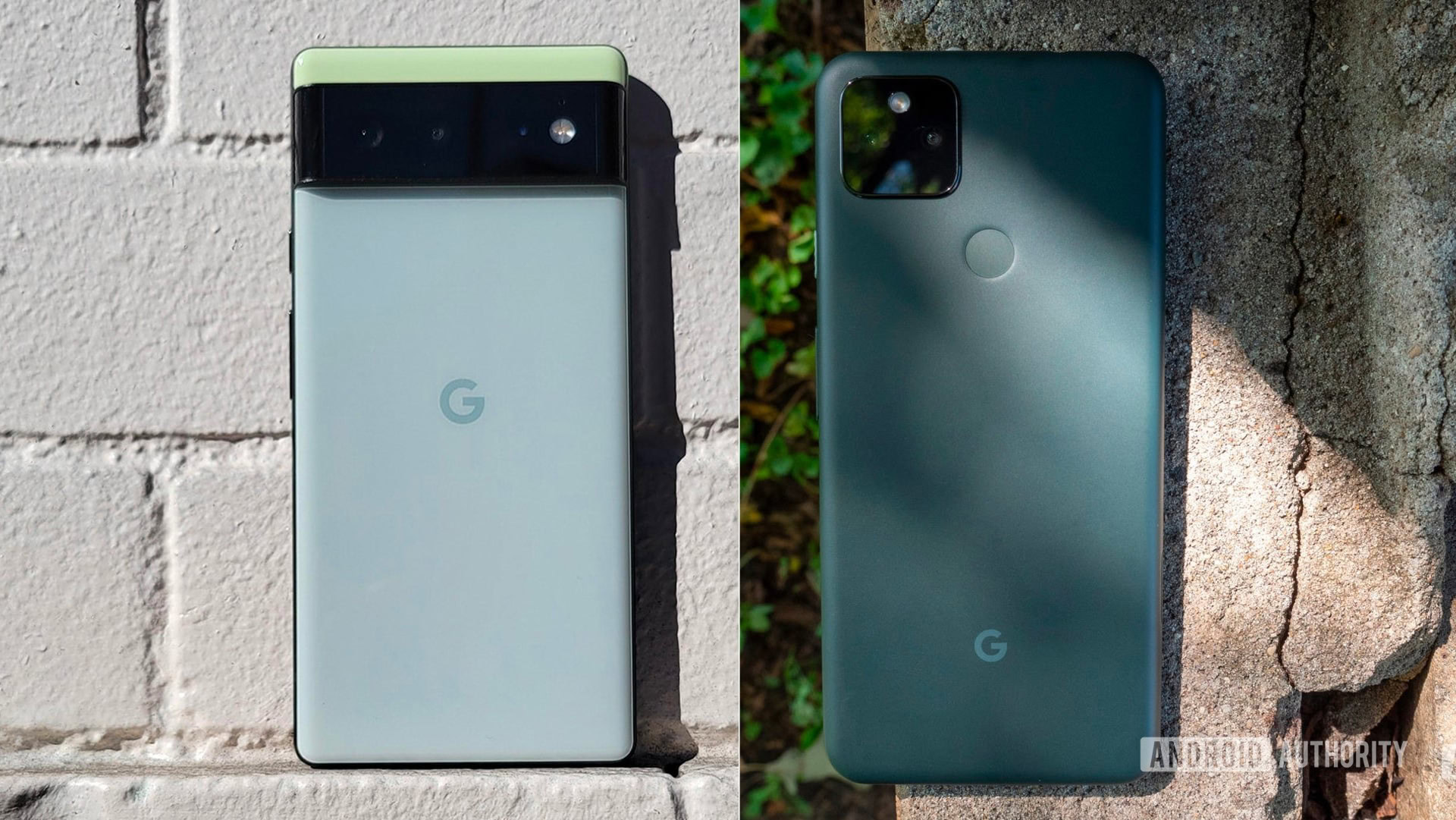
Google’s latest Android flagships, the Pixel 6 and 6 Pro, are finally here. They feature new designs, Google’s own chipset, and improved cameras. However, Google’s affordable Pixel 5a has only been available for a few months at this point. So, should you go for the latest and greatest from Google, or is the Pixel 5a a better option for you? Let’s find out in our Google Pixel 6 vs Pixel 5a comparison.
We’ll dig into the most important specs and the prices of each model to give you a better idea of which Pixel is right for you. Let’s get to it.
If you want to make the choice even tougher, Google has also announced its Pixel 6a. It follows a closer design language to the Pixel 6, complete with the powerful Tensor chip onboard. Check out our Pixel 6 vs Pixel 6a and Pixel 5a vs Pixel 6a comparisons to learn more.
Our thoughts: Google Pixel 6 Pro review | Google Pixel 6 hands-on
Google Pixel 6 series vs Pixel 5a
Specs
| Google Pixel 5a | Google Pixel 6 | Google Pixel 6 Pro | |
|---|---|---|---|
Display | Google Pixel 5a 6.34-inch OLED 2,400 x 1,080 resolution 413ppi 20:9 aspect ratio 60Hz refresh rate Corning Gorilla Glass 3 | Google Pixel 6 6.4-inch AMOLED 2,400 x 1,080 resolution 411ppi 19.5:9 aspect ratio 90Hz refresh rate Corning Gorilla Glass Victus | Google Pixel 6 Pro 6.7-inch LTPO AMOLED 3,120 x 1,440 resolution 512ppi 19.5:9 aspect ratio 120Hz refresh rate Corning Gorilla Glass Victus |
Processor | Google Pixel 5a Qualcomm Snapdragon 765G | Google Pixel 6 Google Tensor | Google Pixel 6 Pro Google Tensor |
RAM | Google Pixel 5a 6GB | Google Pixel 6 8GB | Google Pixel 6 Pro 12GB |
Storage | Google Pixel 5a 128GB | Google Pixel 6 128GB 256GB | Google Pixel 6 Pro 128GB 256GB 512GB |
Power | Google Pixel 5a 4,680mAh 18W fast charging No wireless charging | Google Pixel 6 4,614mAh 30W fast charging 21W wireless charging | Google Pixel 6 Pro 5,003mAh 30W fast charging 23W wireless charging |
Cameras | Google Pixel 5a Main: 12.2MP dual-pixel 1.4μm pixel width Autofocus with dual pixel phase detection Optical + electronic image stabilization ƒ/1.7 aperture 77-degree field of view Secondary: - 16MP ultra-wide 1.0μm pixel width ƒ/2.2 aperture 117-degree field of view (107-degrees after distortion correction) Front: - 8MP 1.12μm pixel width ƒ/2.0 aperture (fixed focus) 83-degree field of view | Google Pixel 6 Main: 50MP wide 1.2μm pixel width ƒ/1.85 aperture 82-degree field of view Optical + electronic image stabilization Secondary: 12MP ultra-wide 1.25μm pixel width ƒ/2.2 aperture 114-degree field of view Lens correction Front: 8MP 1.12μm pixel width ƒ/2.0 aperture Fixed focus 84-degree field of view | Google Pixel 6 Pro Main: 50MP wide 1.2μm pixel width ƒ/1.85 aperture 82-degree field of view Optical + electronic image stabilization Secondary: 12MP ultra-wide 1.25μm pixel width ƒ/2.2 aperture 114-degree field of view Lens correction Tertiary: 48MP telephoto 0.8μm pixel width ƒ/3.5 aperture 23.5-degree field of view 4x optical zoom Up to 20x Super Res Zoom Front: 11.1MP 1.12μm pixel width ƒ/2.2 aperture Fixed focus 94-degree field of view |
Audio | Google Pixel 5a Stereo speakers Headphone jack | Google Pixel 6 Stereo speakers No headphone jack | Google Pixel 6 Pro Stereo speakers No headphone jack |
Biometrics | Google Pixel 5a Rear-mounted fingerprint reader | Google Pixel 6 Under-display fingerprint reader | Google Pixel 6 Pro Under-display fingerprint reader |
Software | Google Pixel 5a Android 11 | Google Pixel 6 Android 12 | Google Pixel 6 Pro Android 12 |
Dimensions and weight | Google Pixel 5a 154.9 x 73.7 x 7.6mm 183g | Google Pixel 6 158.6 x 74.8 x 8.9mm | Google Pixel 6 Pro 163.9 x 75.9 x 8.9mm |
Colors | Google Pixel 5a Mostly Black | Google Pixel 6 Kinda Coral Sorta Seafoam Stormy Black | Google Pixel 6 Pro Cloudy White Sorta Sunny Stormy Black |
Design and display
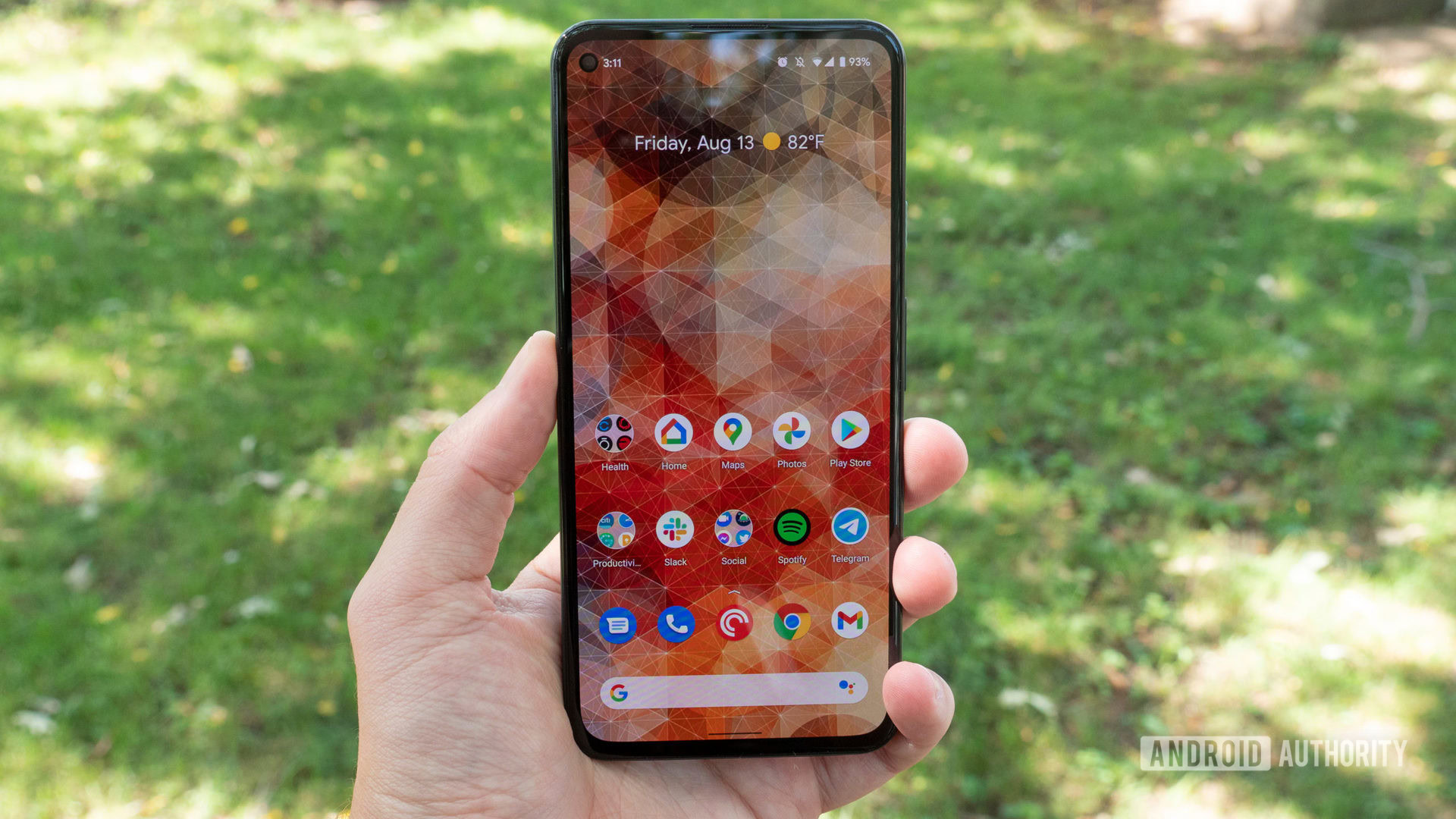
The Google Pixel 5a sticks to a tried and true formula, and it launched with an almost identical design to the Pixel 5. It keeps the corner-mounted punch hole camera, corner-mounted rear cameras, and the same button layout that Pixel users know and love. Google’s Pixel 5a has a headphone jack as well, something you won’t find on the OEM’s proper premium devices.
Read next: Google Pixel 5a review
The Pixel 5a is also slightly larger than Google’s previous flagship, offering a 6.34-inch display compared to the 6.0-inches of its namesake. It packs a Full HD+ resolution, a 60Hz refresh rate, and Corning’s Gorilla Glass 3. It also sports an aluminum body design and an IP67 rating that can handle a little more adventure than the previous plastic versions.
However, the Pixel 5a seems to be the last of its kind. With the Pixel 6 series, Google has thrown the previous rulebook out the window. Gone are the corner-mounted cameras on both sides, and the bio resin-coated aluminum of the Pixel 5 has made its exit as well. Now, the Pixel 6 and the Pixel 6 Pro sport a glass sandwich design for a more premium look and feel.
Google is back to the glass sandwich design for the Pixel 6 series.
Google’s new duo features the company’s largest displays yet, with the Pixel 6 opting for a 6.4-inch display and the Pixel 6 Pro soaring to 6.7 inches. Both offer AMOLED panels, though the Pixel 6 stops at a Full HD+ resolution while the Pixel 6 Pro heads for Quad HD+. Once again, the Pro model holds an edge on the refresh rate, offering 120Hz to the vanilla model’s 90Hz. The front-facing camera resides in a central punch hole, but the most noticeable change lies in the new camera bump. It’s a drastic departure for Google, and we’ll dig into the nitty-gritty in the next section.
Hardware and cameras
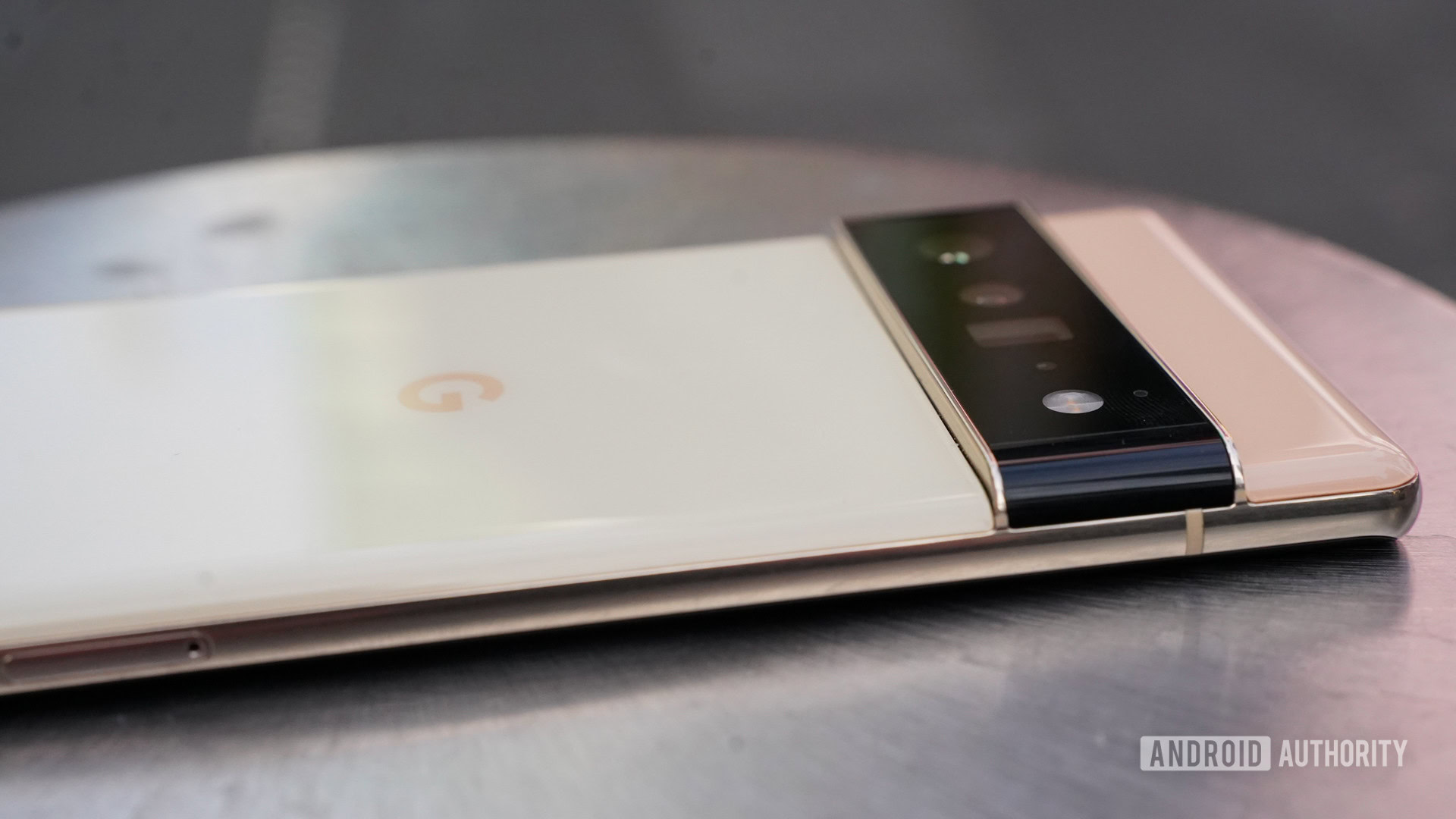
The Google Pixel line has always been at the forefront when it comes to smartphone photography. While the Pixel 5a didn’t shake things up in terms of hardware, the image processing has never been better. The mid-range device stuck with a very familiar setup on the back, with a 12.2MP main shooter and a 16MP ultrawide option. It’s the same setup you’ll find on the Pixel 4a 5G and Pixel 5.
See also: The best camera phones you can get
However, the Pixel 6 series offers something completely different. The camera bar is impossible to miss, and it looks nothing like Google’s traditional corner-mounted arrays. Both the Pixel 6 and the Pixel 6 Pro have finally bid farewell to the 12.2MP primary shooter in favor of a 50MP wide option. The pair offers a 12MP ultrawide lens as well, but you’ll have to go for the Pixel 6 Pro if you want Google’s first triple camera. It carries a 48MP telephoto lens that’s capable of up to 4x optical zoom.
Google’s upgrades don’t stop at the cameras when comparing the Pixel 6 vs the Pixel 5a. The mid-range device comes with 6GB of RAM and 128GB of storage on board, as well as the Qualcomm Snapdragon 765G SoC. It’s once again unchanged from the Pixel 5, and it helps to keep the costs low.
Gone are the days of the Snapdragon 765G; the Pixel 6 series means that it's Tensor time.
The Pixel 6 series, on the other hand, is the first to offer Google’s brand-new Tensor chip. It’s been a long time coming, and the new silicon promises the best photo and video results of any Pixel device to date. Another key aspect of the new chip is that it allows Google to offer a whopping five years of guaranteed security updates. The company also promises three years of OS updates. Google added the Titan M2 security chip for good measure, which brings end-to-end security into the picture with anti-phishing and anti-malware protection.
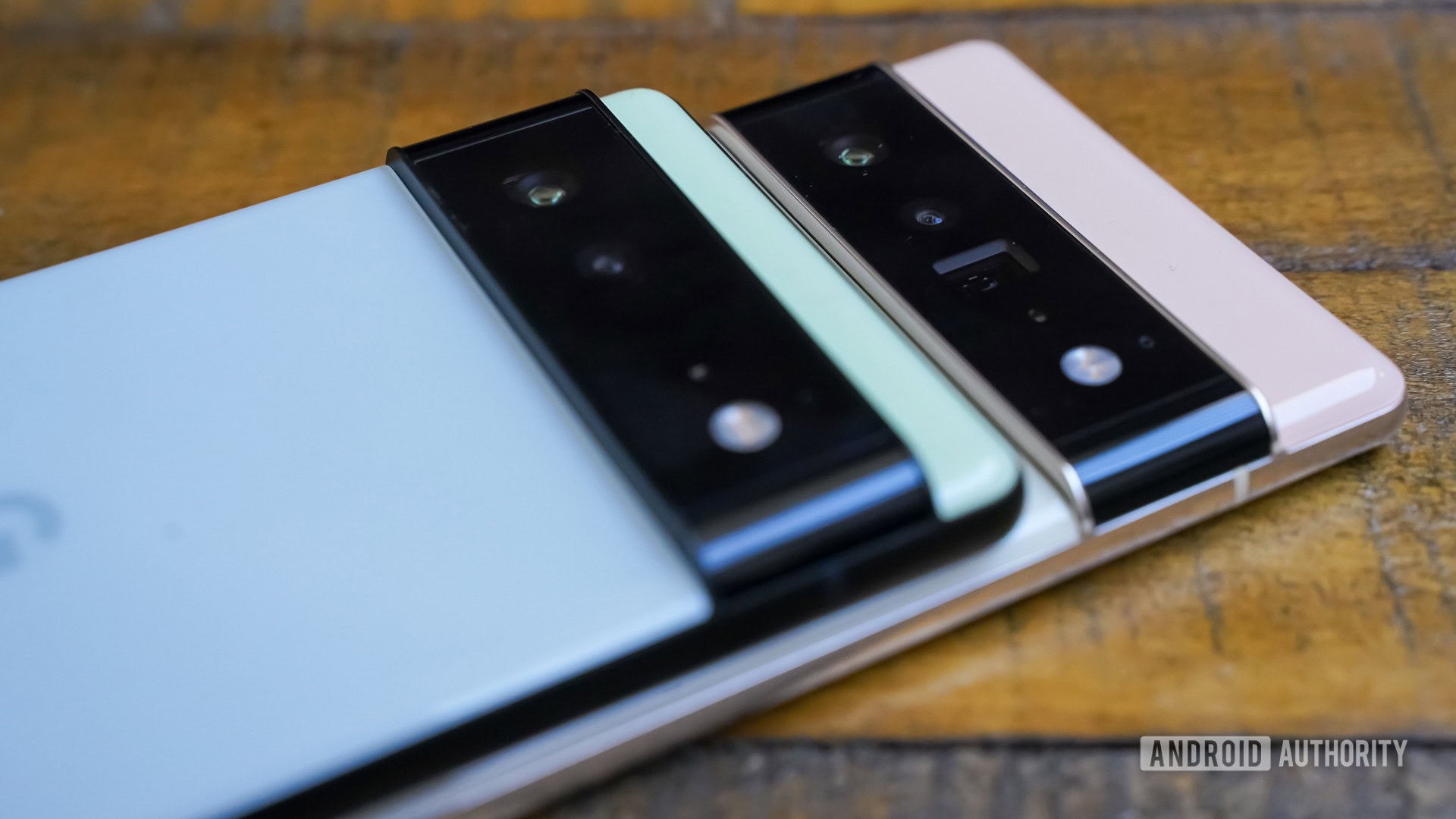
You’ll also find more RAM and storage options on Google’s latest flagships. The Pixel 6 offers a familiar 8GB of RAM, along with either 128GB or 256GB of storage. If you need a bit more kick, the Pixel 6 Pro packs 12GB of RAM as well as up to 512GB of storage space.
Need lots of RAM? The best phones with 8GB of RAM | The best phones with 12GB of RAM
The Pixel 5a also boasted the largest battery of any Google Pixel phone until the Pixel 6 series arrived. It offers a solid 4,680mAh cell with 18W fast charging, though you still won’t find wireless charging as an option. As for the new Pixel 6, it offers a slightly smaller 4,614mAh cell with 23W wired charging and 21W wireless charging to get you back on the go faster.
However, the Pixel 6 Pro is Google’s new battery king. It sports a 5,003mAh cell with the same 23W wired and wireless charging. Google’s Pixel family has finally made a move to USB PD PPS charging, which is part of what allows for reliably faster speeds.
Price and colors
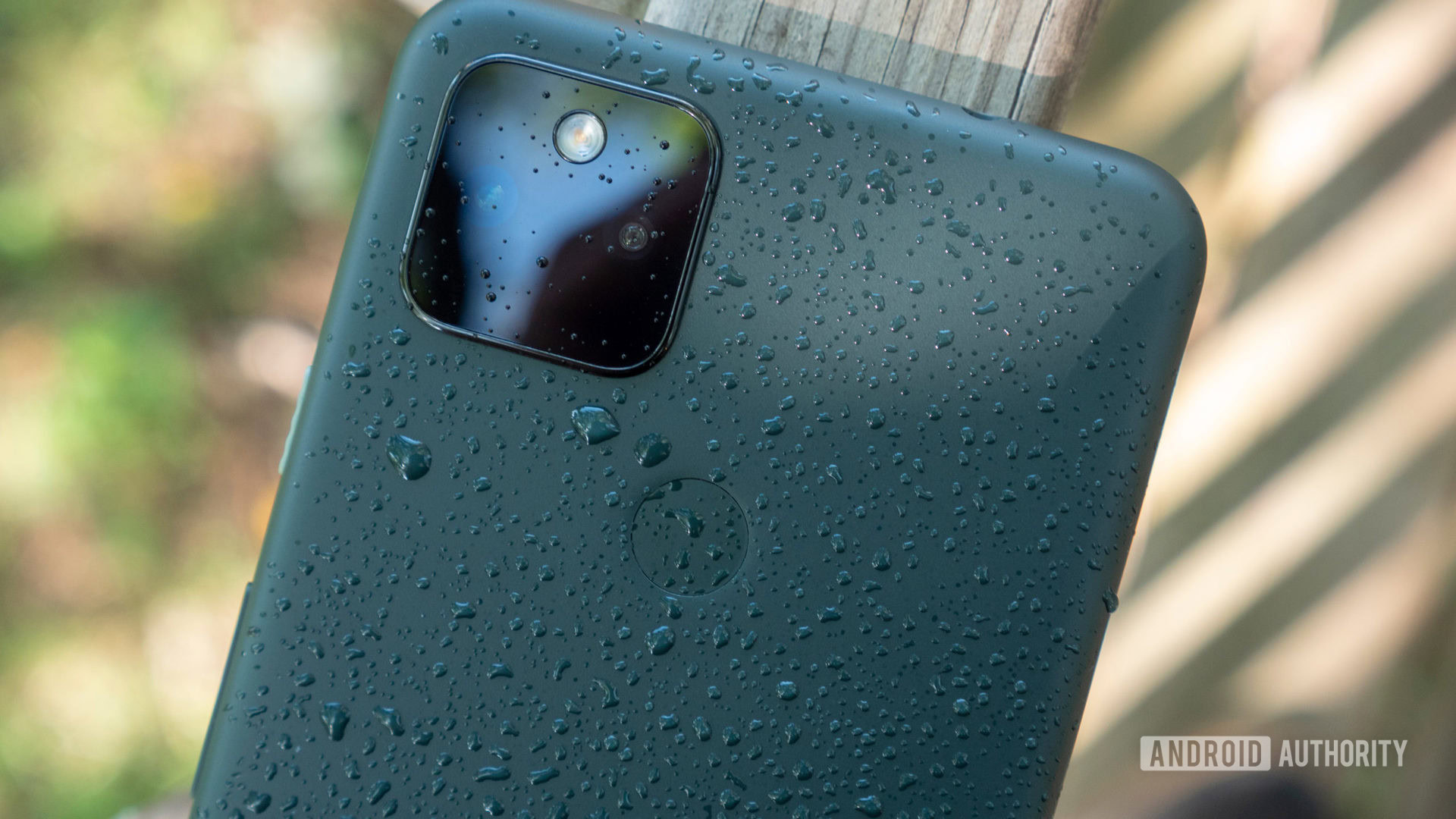
- Google Pixel 5a: $449 / 51,700 Japanese Yen
- Google Pixel 6: $599 / £599 / €649
- Google Pixel 6 Pro: $899 / £849 / €899
With just one version of the Pixel 5a on the market, it’s not hard to find the right price. You’ll get 6GB of RAM and 128GB of storage for just $449 in the United States or 51,700 Japanese Yen — the only two countries in which the device launched. The Pixel 5a is also available in just one color, Mostly Black. It looks more like midnight green in the right lighting, and it’s an attractive option among Google’s history of Just Black devices.
The Pixel 6 and Pixel 6 Pro offer more flexibility in storage options, but that comes at a cost. You can pick up the Pixel 6 with 8GB of RAM and 128GB of storage for $599 or 256GB of storage for $699 in any of the three colors. Google once again dipped into its list of creative names and selected Kinda Coral, Sorta Seafoam, and Stormy Black for its more affordable flagship. The Pixel 6 finally brings back the two-toned designs that so many loved from the early days of the series.
Over on the Pixel 6 Pro, you’ll find 12GB of RAM as the standard. You can pair that with 128GB of storage for $899, 256GB for $999, or a whopping 512GB for $1,099. The color options are slightly more muted, with Sorta Sunny and Cloudy White joining Stormy Black.
Google Pixel 6 series vs Pixel 5a: Which should you buy?
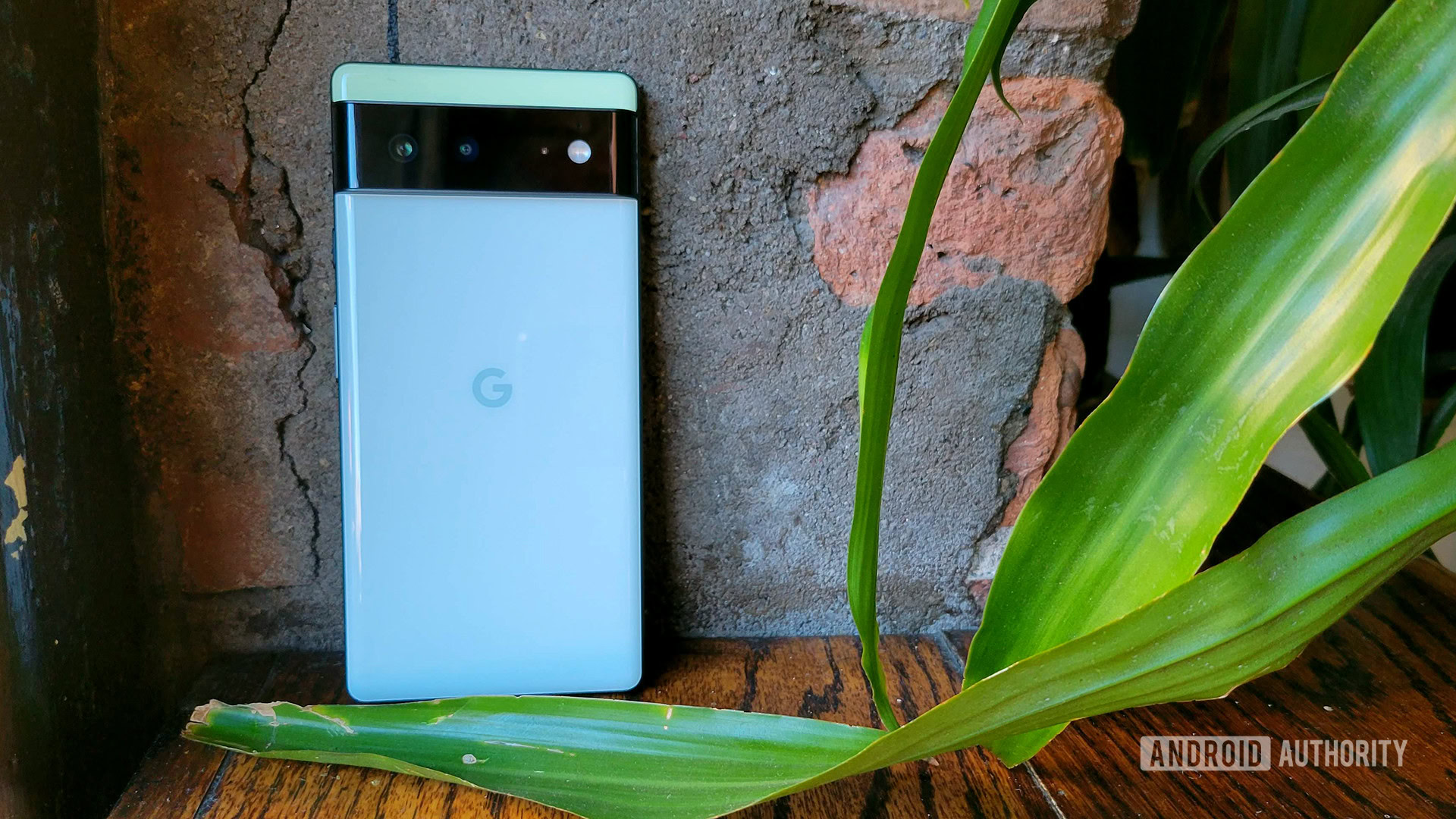
Choosing between the new Google Pixel 6 series and the Pixel 5a is easier said than done. The most significant decision you’ll have to make is whether you need the power of a flagship device or if you want to keep your wallet comfortable with a mid-range alternative.
Google’s Pixel 6 and Pixel 6 Pro have a clear advantage when it comes to the cameras, charging speeds, and future update support with the Tensor chip. However, you’ll have to splash out quite a bit more cash — at least $150 for the Pixel 6 and $450 for the Pixel 6 Pro. The flagship duo offers more screen real estate and an IP68 rating compared to the Pixel 5a’s IP67 rating.
Which phone would you consider buying?
Although the new Tensor chip is one of the Pixel 6 series’ best selling points, it may also be a reason to stick with the Pixel 5a. After all, this is Google’s first chipset, so there may be a few kinks to iron out along the way. It’s also tougher to damage aluminum than glass, so the Pixel 5a might put up with a bit more abuse in everyday situations. However, the Gorilla Glass Victus on the Pixel 6 Pro will handle more scratches and drops than the Gorilla Glass 3 of the more affordable device.
If you already have the Google Pixel 5a, the choice to upgrade is even tougher. You’ll have to weigh out how badly you want new features like the improved camera and refined design. If you’re enjoying your Pixel 5a and not facing any problems, there’s no need to make the change while we wait to see how the Tensor chip performs.

